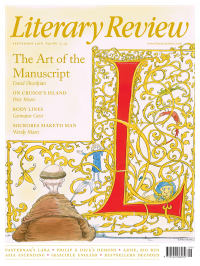John Dugdale
Unmade in Manhattan
Bright, Precious Days
By Jay McInerney
Bloomsbury 397pp £18.99
This is Jay McInerney’s third novel about Corrine and Russell Calloway, a pair of New Yorkers now in middle age. In Brightness Falls (1992), set in the late 1980s, we were introduced to Russell, a publisher, and Corrine, a stockbroker with creative hankerings. That novel culminated in the financial crash of 1987. The pivotal event of The Good Life (2006), in which Corrine had a fling with Luke, a fairy-tale-prince-like banker, was 9/11 – they met while helping out at Ground Zero.
No prizes for guessing, then, that another national and international crisis will figure in the denouement of Bright, Precious Days, or which crisis McInerney will pick, given his lack of enthusiasm for events without Manhattan at their centre. Though he half-heartedly disguises where the story is heading by eliminating dates, we gradually infer that most of it takes place in 2007–8. Wall Street’s woes, however, function merely as a mirroring backdrop. Characteristically, he homes in instead on the personal crises of the couple, which turn into disasters around the time that Lehman Brothers collapses.
For Corrine, the crisis results from Luke’s return to New York, urging her to restart their romance. Meanwhile Russell endures a series of challenges – a rising star who rebels against his editing methods, an author’s untimely death, an expensive gamble on a questionable memoir. These torments jeopardise the viability of his small literary publishing house and hence put in doubt – even as Corrine’s affair is threatening to split the family up – whether they can afford to remain in their rented ‘decrepit loft’.
McInerney, on this evidence, is no devotee of plot: he appears to go out of his way to make his storylines as foreseeable as the politico-financial events unfolding simultaneously. References to the writers Raymond Carver, Breece D’J Pancake and James Frey, for example, provide clues to the triple bad news awaiting Russell.
Rather than gripping the reader, these predictable and underwhelming twin narratives seem to give the author a framework for what really engages him, namely social mores. The novel contains vivid writing about not only adultery and books but also trends in parties, fundraising banquets, celebrities, food and restaurants, gadgets, shopping, decor, parenting, children’s health, the property market and changes to the cityscape.
Through such passages, McInerney builds up a multilayered survey of Manhattan shortly before the 2008 crash, and this brings out the best in him. Everything is seamlessly woven into Russell’s or Corrine’s experiences, not patched on to them. McInerney’s playful set-piece scenes of social observation (such as dining bankers competing with each other by ordering vintage wines at ever-crazier prices) are invariably more memorable than the serious depictions of lovers’ trysts, family rows or professional humiliations.
The technique of cleaving closely to the perspectives of the main characters serves the novel well when logging lifestyle minutiae, but it has a severe drawback. Although they are well-travelled intellectuals, the Calloways are staggeringly myopic, showing little interest in New York City’s other boroughs, let alone the rest of the US, or in politics, economics, big ideas or emerging social forces. Because the book presents the world through their eyes, it seems just as blinkered as they are. Nothing matters unless it happens in Manhattan; even Washington and Silicon Valley appear as distant as Baghdad and Kabul.
Other New York novels, in contrast (one thinks of Tom Wolfe’s The Bonfire of the Vanities), have managed to observe their protagonists and the city externally; or they are polyphonic works (such as Don DeLillo’s Underworld and Thomas Pynchon’s Bleeding Edge), containing misfits who voice critical views and characters embodying aspects of the zeitgeist; or (The Great Gatsby, for instance) they are narrated by or via figures who are at once insiders and outsiders.
McInerney nods to Fitzgerald in the Calloways’ surname and in the novel’s opening, which evokes generations of ‘people of the book’ drawn to the ‘island of letters’. But this proves a false promise: after that, none of the characters either stands outside Manhattan and gazes at it or looks out from it at the world beyond. Bright, Precious Days is consequently as annoyingly shallow and insular as it is pleasantly polished and diverting.

Sign Up to our newsletter
Receive free articles, highlights from the archive, news, details of prizes, and much more.@Lit_Review
Follow Literary Review on Twitter
Twitter Feed
The latest volume of T S Eliot’s letters, covering 1942–44, reveals a constant stream of correspondence. By contrast, his poetic output was negligible.
Robert Crawford ponders if Eliot the poet was beginning to be left behind.
Robert Crawford - Advice to Poets
Robert Crawford: Advice to Poets - The Letters of T S Eliot, Volume 10: 1942–1944 by Valerie Eliot & John Haffenden (edd)
literaryreview.co.uk
What a treat to see CLODIA @Lit_Review this holiday!
"[Boin] has succeeded in embedding Clodia in a much less hostile environment than the one in which she found herself in Ciceronian Rome. She emerges as intelligent, lively, decisive and strong-willed.”
Daisy Dunn - O, Lesbia!
Daisy Dunn: O, Lesbia! - Clodia of Rome: Champion of the Republic by Douglas Boin
literaryreview.co.uk
‘A fascinating mixture of travelogue, micro-history and personal reflection.’
Read the review of @Civil_War_Spain’s Travels Through the Spanish Civil War in @Lit_Review👇
John Foot - Grave Matters
John Foot: Grave Matters - Travels Through the Spanish Civil War by Nick Lloyd; El Generalísimo: Franco – Power...
literaryreview.co.uk